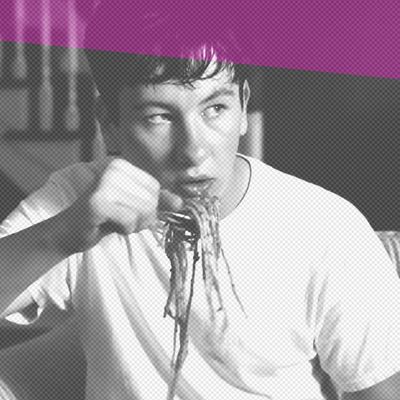
Some of 2017’s best movie moments were defined by food. I’m not talking about the food itself, or about great scenes featuring people calmly eating delicious-looking food — I’m talking about the way people used (and occasionally abused) totally mundane food items. Whether they were devouring them in a deranged manner, turning them into some sort of sexual apparatus, or using them as murder weapons, 2017 was, quite possibly, the best year for movie food since 2016, which gave us Moonlight’s sexy chef special. My food baby and I are very happy to present this list of the ten best onscreen uses of food items in 2017. Bon appétit!

Spaghetti, The Post
The Post’s team of reporters are working ’round the clock in Ben Bradlee’s (Tom Hanks) living room, reading pages and pages of text, trying to decipher Daniel Ellsberg’s (Matthew Rhys) leaked Pentagon Papers. Things are relatively calm until Bradlee’s wife, Tony (Sarah Paulson), serves them a dinner of hot, steaming spaghetti with marinara. That noodles become a key prop in a tantrum: Fritz Beebe (Tracy Letts) lectures Bradlee against publishing reports on the papers, citing legal concerns. Because Bradlee can’t exactly roll his eyes, he’s twirling his fork furiously, ignoring the higher-up: his house, his rules. The whole thing is delightful. However, there is a reason this pasta is at No. 10. While it’s not in my nature to ever say no to a plate of pasta, something feels slightly amiss here: No one is mixing up the noodles with the sauce!!! But they’re ravenous and saving the republic, so maybe they’re onto something we’re not.

Breakfast Cereal, Three Billboards Outside Ebbing, Missouri
I’ve said it before and I’ll say it again: White people talk to their parents so crazy. Mildred Hayes (Frances McDormand) has a pair of knock-down, drag-out fights with both of her children. But things reach another level of ludicrous when Mildred exchanges insults with her son Robbie (Lucas Hedges). They’re battling about something or other — and privately grieving the death of Mildred’s daughter Angela — when Mildred flicks cereal directly into Robbie’s face. “No acting required,” Hedges assured Vulture when we asked him about the scene. “[McDormand] just flicks food at your face and you get a little annoyed.”
First of all, flicking cereal is, at once, so childish and snide that I have to respect it as a power play. It’s the most effective insult Martin McDonagh’s movie has to offer, more potent than any of his biting one-liners. It’s almost like these two characters have devolved to primary-school lunchtime bullying. I approve.

Mushrooms, The Beguiled
The Beguiled is both a totally feminine, ephemeral retelling of the ’70s Southern Gothic movie and a very well-directed dramatic episode of The Bachelor. (These are both compliments.) When Corporal John McBurney (Colin Farrell) stumbles into Miss Martha’s (Nicole Kidman) school for southern belles, the house full of women flies into a tizzy. They’re stumbling over themselves trying to avoid or impress him (usually simultaneously) as they take care of him while he recovers — and as he slyly seduces several of them at once. A little gross masculinity goes a long way, though, and soon enough, he needs to be done away with. So the women poison him with mushrooms — which Sofia Coppola films with an almost loving gaze, like a sacrificial offering — and he lands to the floor with a thud. How’s that for #resist?

Pie, A Ghost Story
For at least a month after A Ghost Story’s release, “that scene where Rooney Mara ate that entire pie” was the internet’s (okay, film Twitter’s) obsession. It was the scene people at Sundance couldn’t shut up about, it was “foul to watch,” there was even an explainer. The pie scene rose from the status of trendy to mythic when it turned out that Rooney Mara (cool hip actress slash heiress) didn’t even like pie, and had never had pie before.
I don’t like pie and have also never had it, so Mara’s pie-eating seemed perfectly okay to me. Grieving is illogical and emotional. It demands patience and generosity. So does A Ghost Story. For all the moments in this movie that didn’t resonate with me, watching a sad girl eat an entire dessert seemed torturous yet cathartic. The way she stabbed at it out of frustration and disgust (with herself? with her pain?) was moving. Parts of A Ghost Story didn’t totally work for me—[clears throat roughly] Casey Affleck bullying a perfectly nice family out of their home!—but the pie scene had a haunting, visceral style. Plus, A24 made this goofy little video to support it.

Tea, Get Out
In pop-culture parlance — often originated by black or queer communities — we spill tea and we sip it, depending on how juicy the gossip is. In Get Out, Catherine Keener’s stereotypical white liberal mom weaponizes it. Before black victims see the white family’s underground laboratory, Keener hypnotizes them, using her cup of tea to trigger their descent into the sunken place. The film’s little tea-centric tics — Keener tapping her tea cup, or the family’s black maid (Betty Gabriel) overpouring a guest’s iced tea — make it a more than worthy addition to this list. The next time a white person orders tea in my presence, I might go ahead and order my Lyft home for safety.

Waffles With Maple Syrup, The Florida Project
Moonee (Brooklynn Prince) has a problem with maple syrup, according to her mother Halley (Bria Vinaite). It makes her toot too much, stinking up the motel room they live in. It’s a funny and touching admission — the kind only a mother knows — and in one line, we get a sense of how unconventional Halley’s life and Moonee’s childhood is. It’s doubly meaningful, then, when Halley plans a makeshift last supper for her daughter after it’s revealed they’re running out of money and options. Halley sweet-talks their way into brunch at a country club and lets Moonee order a full meal of pancakes, waffles, bacon, sodas, several desserts, and all the maple syrup she can stomach. Maple syrup is the most moving parting gift — before social workers come to take Moonee to a more stable home.

Grapefruiting, Girls Trip
Feeling out of the game, Jada Pinkett Smith’s Lisa asks her girlfriends how to keep things interesting in the bedroom with her younger lover (Kofi Siriboe — incredibly hot). Tiffany Haddish’s Dina immediately suggests “grapefruiting”: Cut two sides off a grapefruit, and cut a hole in the middle, and then “you want to squeeze and twist and suck,” she explains, to create maximum pleasure. Then she demonstrates, quite graphically and hilariously, vacuuming a banana in and out of her mouth — taking a brief pause to gag for effect.
I am so happy that I only halfway knew what grapefruiting was before this movie. Here is an objectively true statement that I am happy to report: This is the funniest thing to happen onscreen in 2017. (Its only competition: When Reese Witherspoon confused Sade and Adele on that episode of Big Little Lies.) The grapefruiting scene is a perfect combination of meme-ry (grapefruiting began as a viral video), Haddish’s kindergarten-teacher delivery, and Pinkett Smith and Latifah dutifully watching, as if they’re about to take notes. It’s just like Samantha said in Sex and the City: “Easy? Honey, they don’t call it a blow job for nothin’.”

A Peach, Call Me by Your Name
Only Call Me by Your Name could bring the peach emoji to the upper echelons of eroticisim in a post-Kimoji world. You know how this goes: 17-year-old Elio (Timothee Chalamet) is swooning over 24-year-old Oliver (Armie Hammer) one summer in Italy. On a hot, errand-free day, Elio plucks a peach from a tree on his parents’ property, takes it with him to the attic, and masturbates with it. “I thought it was a scene that can only play in a book, because you could go into your imagination,” director Luca Guadagnino told Vulture. It was a metaphor for sexual impulses that he had to try himself to decide if they could include it in the film.
The peach scene is deeply sensual, but not at all gratuitous. In the book, Oliver eats the cum-filled-peach to show how thoroughly he loves and identifies with Elio. Onscreen, Oliver begins to take a bite of the peach before stopping. Hammer’s performance conveys that he’s finally understanding Elio’s naïveté, in spite of his pretentiousness. The scenes play to different, but moving, conclusions: The lovers are alike in even their most erotic and neurotic impulses, and nothing has to be off limits.

Asparagus, Phantom Thread
In Paul Thomas Anderson’s twisted, divine Phantom Thread, Reynolds Woodcock (Daniel Day-Lewis) is exacting and persnickety, like a hybrid of Adrian Monk and Miranda Priestly. Alma (Vicky Krieps) is his muse and lover, more clever and hilariously manipulative than she initially seems. In one scene, she attempts to make a big romantic gesture, dismissing Reynolds’s staff early to pull off a date night. This fails spectacularly.
Reynolds likes his asparagus cooked simply and specifically, with a little butter. Alma knows this, he says, so why didn’t she prepare it this way? What’s the matter with her, why would she drown his asparagus; is she trying to intentionally dissatisfy him? (Picky eaters, you will feel very seen.) It’s a brilliant temper tantrum to watch. Reynolds doesn’t break eye contact, doesn’t stop picking at Alma, insulting her, trying to get her to break. The sound design here is particularly masterful: hearing his knife saw the asparagus, his fork pick at it, his slow, deliberate chews is a performance all on its own.

Spaghetti dinner, Killing of a Sacred Deer
Nicole Kidman’s Anna Murphy has come to confront Barry Keoghan’s Martin about the mysterious illness that’s plaguing her family. The mood is tense, taught, terrifying. Strangely — and impressively — Keoghan only magnifies the tension by digging messily into a plateful of what appears to be leftover, reheated spaghetti. As he eats, he explains to Anna that his dad, before his death, had twirled his fork around spaghetti noodles — and at one point, Martin thought he inherited this quirk, until realizing it was something everybody did. “This made me very upset,” he deadpans, shoveling spaghetti into his mouth, the sauce spilling over his lips and face. “Very upset. Maybe even more upset than when they told me he was dead, my dad.”
The scene is short but monstrous. Keoghan is unnerving as he scoops gigantic forkfuls of noodles into his mouth, staring at Kidman without breaking her gaze or blinking. The spaghetti itself seems menacing in its mundanity. Keoghan told Vulture he tried to eat the plate of food as sloppily as he could. “I think in that way, everybody does eat spaghetti the same way,” he said. “It’s such a cool piece of dialogue to play around with in that scene. He gets so upset about that, not the fact that his father has died but this spaghetti thing.” Somehow, it’s one of the most chilling scenes of the year.


